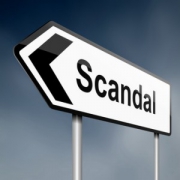Why Promotion Is a Moral Hazard

Jessica Kennedy gets frustrated when people—often academics—try to paint industry and finance as evil. Business rightfully attracts moral critique, of course, but that doesn’t mean there aren’t those in industry who are awake and alert to its ethical shortcomings. Kennedy points out that, while working in investment banking, she was as focused on ethics then as she is today. The associate professor of management at Vanderbilt University has her attention trained on a number of things, notably hierarchies, and how they become dysfunctional, often in business.
Recently she highlighted some of her new work in Harvard Business Review. She explained, in a piece titled “Does Getting Promoted Alter Your Moral Compass?” how the intensity of group identity can negatively affect ethical decision making among high-ranking employees. “I see moral implications in almost any decision or characteristic, from overconfidence to dissent to discrimination, so my research areas really just reflect my everyday worldview,” she told Ethical Systems.
We caught up with Kennedy to discuss those results, along with why the oxymoron of ethical business is, unfortunately, still a good joke, how people can foster more ethical cultures in the workplace, and other new work she’s conducting, like on “hyper-accountability.”
In your recent Harvard Business Review piece, you seem to suggest that being promoted is a kind of moral hazard, because higher-ranking members of companies tend to more strongly identify with their company. Why is it that when we strongly identify with a group, like our company, our moral compass can skew in unfortunate ways when the company faces an ethical issue?
It’s fundamentally that our self-worth is at stake when identification is high. We want to see parties that we identify with positively. It’s painful to see flaws in anything we identify strongly with, be it a company, nation, occupation, religion, club, or family. Ethical flaws are especially threatening because we often care more about morality than sociability or competence when we form impressions. People find ethical errors more diagnostic of the underlying quality than, say, episodes of incompetence are about true competence. If I find that my group did something incompetent, I am more likely to think we can fix it, and it’s a one-off fluke. But if I find that my group has an unethical practice, this quality seems more immutable, more revealing.
So if it’s a practice where we can self-deceive into rationalizing, justifying, or minimizing the issue, we might take that approach first. Of course, the rational thing to do would be to find and weed out critical flaws in order to help our groups, but people aren’t as rational as I’d like them to be. After people come to identify strongly with a group, it’s hard for them to maintain a positive image of themselves if they come to see that group as flawed in any important sense, but especially in an ethical sense.
If anyone tells you “business ethics is an oxymoron,” then don’t promote them! Just kidding, kind of.
How does identity strength shift as people move up the ranks?
High-ranking people not only identify more with their groups but also feel more responsible for the group’s practices and have often invested more time and energy in rising through the ranks at a company, so these additional factors could compound the effects of identification for people of high-rank—leading them to escalate commitment. I don’t think this is usually a conscious process. It’s a shift in perception. In my studies, people rated an unethical practice as less unethical when they held higher rank. It was a privately-completed survey, so they had no reason to defend an unethical practice. They just saw it differently.
You write, “Although a common joke suggests that ‘business ethics’ is an oxymoron, in environments where people publicly support ethical practices, our research suggests that widespread deference to those principles—even when they come at a personal cost—becomes more common.” That joke’s been around for a while. Do you think it has lost any of its punch as a result of the growing focus ethics is getting in business?
I wish I could say so, but many people still have very narrow views of what it means to succeed in business. They often fall prey to the naturalistic fallacy, also called the is-ought fallacy, where whatever they see happening, they infer that’s how it should be. So when leaders very publicly fail due to ethical lapses, some people are inclined to say, “See, that’s just how business is,” instead of learning a more inspiring lesson. In leadership class, I tell students that organizations can perform at three levels and the best organizations aren’t only performing at the output level, they’re performing at the individual and team levels, helping people learn and enabling positive, healthy relationships.
Do you think more sophisticated notions of success will emerge?
I’m optimistic, if we can get business students to consider ideas like the three levels of performance, and leaders to translate into practice the ideas from the CEO Roundtable’s recent “Purpose of a Corporation” statement. Still, that old quip about business ethics being an oxymoron is still around. I think it reveals a lot about the person who says it—it tells you their level of cynicism and signals that they themselves are likely to be overly instrumental in their behavior, meaning the ends can justify the means to them. Also, just like another popular quip, “Those who can’t do, teach,” it shows you that the person probably has low need for cognition. No one who has thought very hard can defend these statements. I understand statements like these as efforts to fight back against the power of ethical principles (in the first case) and intellectual authority (in the second case).
Subscribe to the Ethical Systems newsletter
Referring again to that quote of yours, what do you think is the sort of environment that gets people to openly favor ethical practices?
It’s fundamentally about communicating a pluralistic conceptualization of success that people remember even when they’re busy, under pressure, and stressed. It’s very helpful for leaders to set out a mission statement that highlights the moral significance of the company’s work, to establish business principles that recruits who want to join the organization familiarize themselves with, and to explicitly establish key norms the second that people join the organization by sharing telling anecdotes and modeling the right behaviors. If people come to identify with groups as they rise through the ranks, they can come to identify with groups’ positive practices as well as with their negative practices. Having good values allows us to examine our behavior for places we might not fully uphold those values. Values help people remember that the organization defines success not only as the monetary outcome but also as upholding certain written or unwritten rules. In other words, process matters, not only the outcome. How you get there matters.
It also helps to highlight the usefulness of having the right principles.
Right. For instance, treating others with civility and respect allows people to focus fully on their work without ruminating on negative social interactions, so civility and respect make a lot of sense, but this may not be obvious to everyone while they are working in a fast-paced environment.
How do you think about dissent in the workplace?
I think dissent is important. It’s easy for even the best-intentioned people to have ethical blind spots. Living out our values doesn’t unfold perfectly in an instant. Ensuring that everyone has a voice and can speak their views without fear of ostracism and punishment is very helpful to establishing an ethical culture. Conversely, unreasonable goals, norms against “rocking the boat,” and monolithic, outcome-only definitions of success are some of the key problems. I have wondered if people would be more interested in ethics if the organization promoted a virtue-based way of thinking about it (what kind of person do you want to be at work?) instead of a more rule-based way of thinking about it (don’t ever do this, always do this), but I haven’t yet tested that idea empirically.
In one of my studies, it was encouraging that the moral authority of an ethical practice seems to reduce dissent. People dissented a lot less against an ethical norm than an unethical one.
What role should lower-ranking members of an organization play in keeping the moral compasses of higher-ups in check?
They need to be included in the process of soliciting dissent—and not just the low-ranking people you like, who think the company is great, and are happy-warriors, but the people who don’t really identify with it, who seem like they aren’t sure they want to be there, who are acting as individuals, not as organization men and women. You may not know if you can trust them. That is what low identification often creates—concern that the person doesn’t care about the group—but these low identifiers are often the ones whose ethical vision isn’t skewed.
What new norms, if any, should companies implement around promotions in order to keep moral compasses from skewing?
If anyone tells you “business ethics is an oxymoron,” then don’t promote them! Just kidding, kind of. I undertook this work to show how unethical practices can result from factors other than evil people being promoted. Still, that can be an issue. Evaluating people for more than their technical competence is important. There are a lot of shady ways to reach goals. It’s important to look for integrity. I’d like to see companies be more conscious of how they accord social status and higher rank. For instance, do people with strong moral identities fit in your organization or do they stagnate and eventually select out of it? Do you treat moral character as an asset or a roadblock? Do you reward arrogance and emotional immaturity or squelch it? A lot of these moral traits hang together into one underlying factor.
I would have loved to be a moral philosopher, but I was late to the game and that would have been a brutal job market!
Would it help for companies to open ethical dialogue and establish some routines around soliciting dissent, especially from people who are newer, who fit less, and who hold lower rank?
Yes. Some companies have established hotlines to improve reporting of ethical problems, but those hotlines seem aimed at egregious ethical issues that, once revealed, will be immediately condemned and corrected. Those issues matter for sure, but ethical issues are rarely so black and white, and everyone has ethical failures. Instead of treating ethical issues as black and white and requiring them to snowball to get attention, why not open discussions about whether this is a good place to work, a good place to be a customer, a good place to supply to, and so on at a regular interval? Then, really listen. Give people anonymity if you need to but have a real discussion. This could amount to holding a pre-mortem on ethical issues. Asking questions like, “If we made the front page of the Wall Street Journal for an ethical problem, what do you think it would be?” Then, you can correct ethical problems before they reach a scale to trigger regulation, legal fees, and other types of inefficiency.
Normalizing statements that show low identification and question the status quo is part of this process. Too often, people need to become an ideal prototype to succeed in organizations. Throwing out these prototypes and tolerating some forms of misfit and dissent may not feel good, but I think it would result in better cultures and fewer ethical scandals.
Can we work to become more conscious of any shifts in our moral compass?
I am optimistic that we can! Maybe it’s only a matter of remembering, “When I was a junior person in this organization, what did I think of its practices? Was there anything that gave me pause, even if I ultimately reconciled myself to it? Did I have any moral reservations?” I’d recommend that leaders keep journals on their way up the ranks so they don’t forget what they thought before they were under so much pressure to produce results.
Are there any other factors, besides de-identifying with your group, that can make your moral compass more robust, or less susceptible to skewing?
As I said, my hope is that identifying with groups will be less of a problem if we get the values and culture right. It will be less of a problem to internalize those standards if they don’t devalue ethics. It is also helpful to have moral exemplars who you keep salient in your thoughts. Whose moral standards do you admire within your family or with your social circle? Finding a way to consider what they would do in your situation or what they would think of your decisions can provide a powerful reality-check.
Another piece of advice is to find a way to monitor whether you feel like the best version of yourself. External monitoring systems often backfire, but internal monitoring is effective. Engaging in activities to promote moral emotions, like keeping a daily gratitude journal or seeking out experiences in nature that give you awe is another good practice.
I really like what Ray Dalio has done in laying out his principles, too. By articulating our principles or the virtues core to who we want to be, this can help counterbalance the effects of our identification with groups that might tell us who we should be to belong to them. By knowing our own values and not letting ourselves get too depleted, we are less likely to lose ourselves in the groups we join.
What else are you interested at the moment besides understanding challenges faced by people at the top of the hierarchy?
Next I’m focusing on the issue of no-win accountability. I think that one reason we have to pay executives so much in the United States is that we treat high-ranking people a lot worse than the academic literature currently suggests—namely, by constantly putting them on the defensive and criticizing everything they do. In political science, it’s called “hyper-accountability.” I’ve got a current project with Phil Tetlock at the University of Pennsylvania where we are testing this idea and looking for some implications for accountability systems.
Another project looks at effects of holding high and low power positions on sexual harassment. Most of the prior research only examined men, not women, so we wanted to disentangle the effects of power and gender. We are finding that it isn’t holding high levels of power per se that promotes sexual harassment. Instead, it’s the power motive, which is most active when people hold low-power positions or when their power is threatened. Men and women don’t react in the same ways to the power motive (at least historically and at this moment in time) and harassment by high-power people is especially harmful, so I think that is why we saw so many of the stories through #metoo feature high-power men, even though our findings suggest that harassment by low-power men is likely more common. We are introducing a measure of a new type of identity that can help to identify who sexually harasses and when.
How is it that you came to study moral psychology in a business context?
I never expected to be doing this. I was a finance major and was really interested in investment banking as an undergrad at Wharton. By my third year in banking, I really liked my group, I’d moved to San Francisco, and I was quite happy. But I missed the academic world. I was doing a lot of reading late at night after work because I cared about new ideas and needed them to be central to my life in some way. So when I reached a transition point and a former professor that I deeply respected recommended that I do a PhD instead of going into private equity, I really considered it. The independent, intellectual nature of the work and the freedom were very appealing to me.
The professor who recommended it to me was an ethicist (a philosopher) from the department where I did my second concentration (Legal Studies & Business Ethics). With his guidance, I chose Organizational Behavior for my field of study because I thought I would have the chance to consider sticky, ambiguous problems that even excellent organizations struggle to resolve, some of which are related to ethics. The social side of organizations plays a huge role in how they function, but my education largely focused on the highly rational, technical aspects of the organization, so to me, Organizational Behavior issues were fascinating and posed a puzzle. Empirical ethical issues were one problem I could study. I would have loved to be a moral philosopher, but I was late to the game and that would have been a brutal job market! Now, I get to have moral philosophers as my friends, luckily.
Have you always seen ethics as vitally important to making work and life meaningful and to sustaining organizations over the long-term?
Yes. At my last employer, I was attracted to their business principles and saw how those principles were a source of meaning, motivation, and competitive advantage. I never saw ethics and business as at odds over the long-term, so describing patterns of behavior that I considered unwise was interesting to me. I hoped that by revealing those problems through research, people would more easily see their folly.
Jessica Kennedy studies hierarchies and gender in work organizations. Her research has been covered by news outlets such as The Wall Street Journal, NPR, Businessweek, Fast Company, New York Magazine, and Time. She teaches the core Leading Teams and Organizations course and an elective on Negotiation for Vanderbilt University’s MBA program. Prior to entering academia, Kennedy worked in investment banking in New York and San Francisco.
Brian Gallagher is the Communications Director at Ethical Systems. Follow him on Twitter @bsgallagher.









